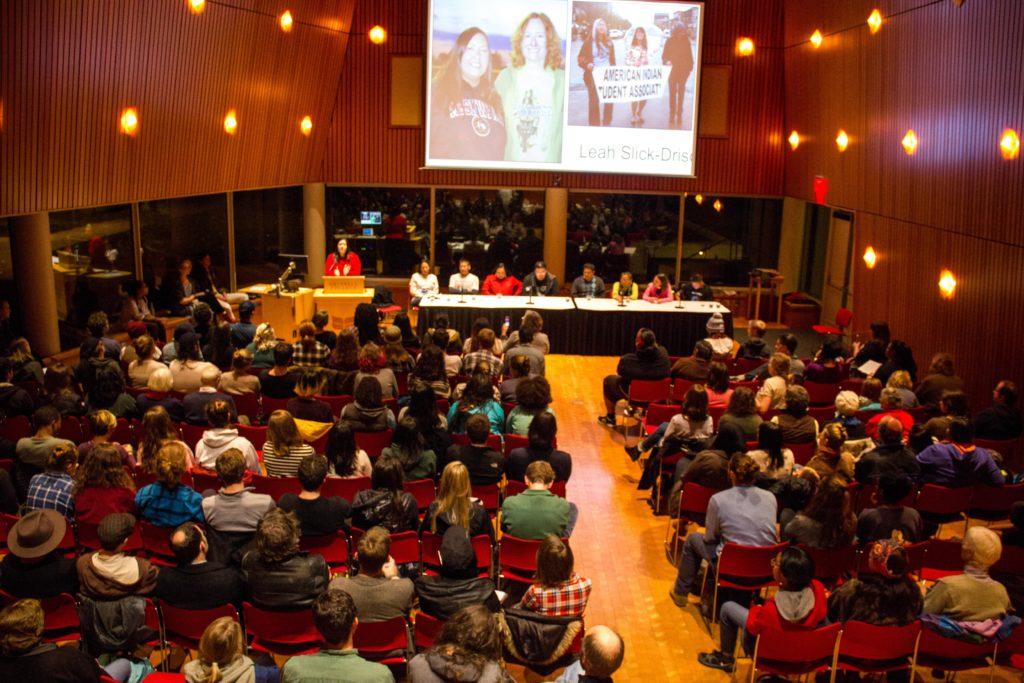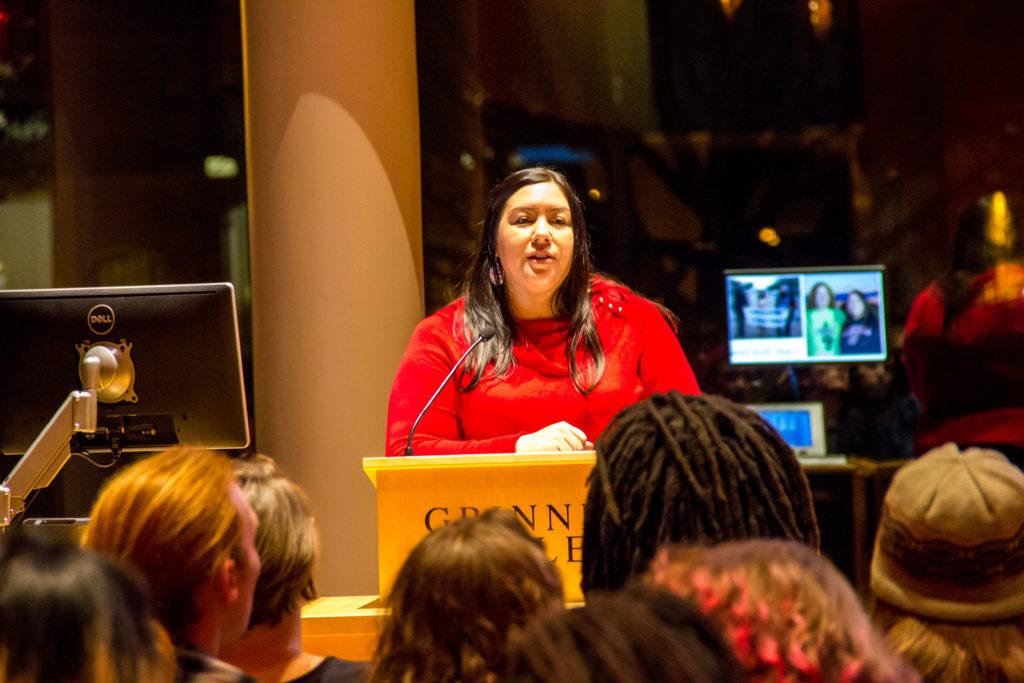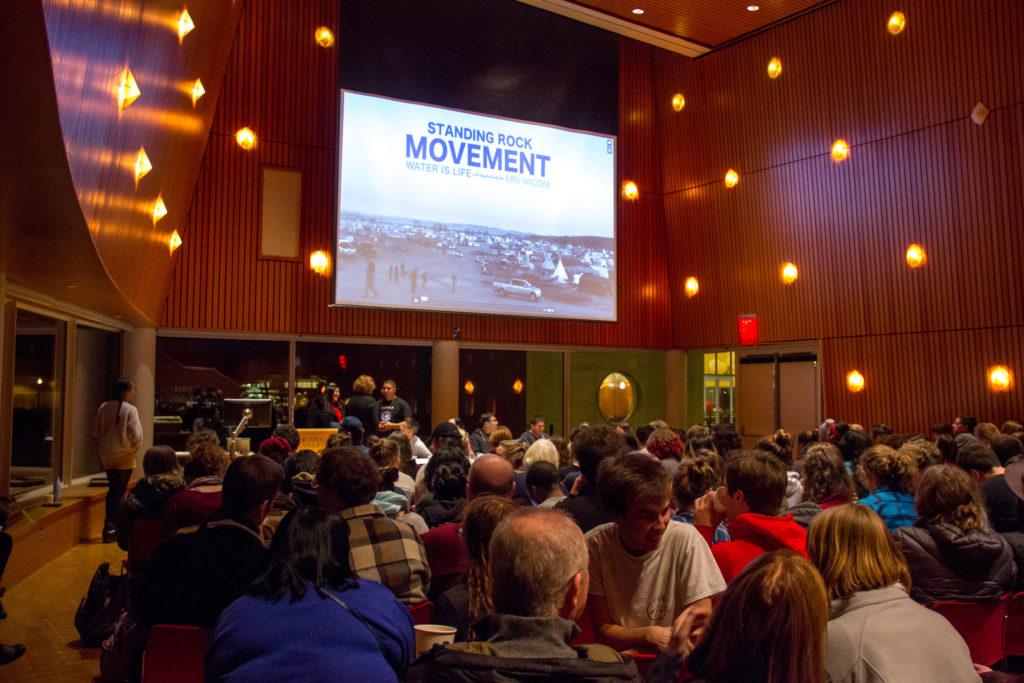By Andrea Baumgartel
baumgart1@grinnell.edu
This past Monday evening, JRC 101 set the backdrop for a panel of speakers from Standing Rock, representing the still-growing resistance against the construction of the Dakota Access Pipeline (DAPL) South Central North Dakota. The high probability of pipeline breakage would result in contamination of the Standing Rock Sioux reservation’s water supply, located just a half mile from the pipeline, as well as the water of surrounding tribal nations and U.S. states such as Iowa. Although the water protectors’ nonviolent protest is being met with intimidation and violence, all of the speakers attested to the transformative love, healing and strength that is Standing Rock.
The speakers included multiple Native American activists and educators, including Tyler Lasley, Mary YoungBear, Quinton Pushetonequa, Bewan Wanatee, LaVern Jefferson and Leah Slick-Driscoll from the Meskwaki Nation, as well as Jenna Thomas from the Rosebud Sioux, Rev. Wendy Abrahamson of St. John’s Episcopal Church and Prolific the Rapper, an indigenous musician who has used music and film to spread the Standing Rock message. All of the speakers have been to Standing Rock multiple times, often in subfreezing conditions, to engage in peaceful protest and help sustain the morale of the camp, primarily through cooking, community building and prayer. In addition to the panel, the event also featured a short film from Grinnellians who have visited Standing Rock to provide water protectors with supplies.
DAPL has met resistance since the pipeline’s initiation nearly nine months ago. Recently, Standing Rock has become, in the words of Professor Deborah Michaels, education, “the epicenter of an international, spiritual and political movement.”

“Most Americans are unaware of what is going on in our country in regards to environmental injustice,” said Slick-Driscoll, who teaches social studies at Meskwaki Settlement School. She defined environmental injustice, specifically in relation to indigenous rights, as “taking the needs of one group over the needs of another group.” Not only does the threat of the pipeline violate multiple laws, including the Clean Water Act and the National Historic Preservation Act, but it also would cut through sacred tribal burial grounds. If — and when — the pipeline were to spill, the oil would severely contaminate the water of Native Americans and others who rely on the Missouri River source.
“Many people in America believe that not talking about these things [like the pipeline] is an act of patriotism … that it would make the U.S. government look bad … but this is simply creating an oligarchy,” Slick-Driscoll continued. “There is a need for a higher level of humanity. People outside need to talk about these issues because it affects all of us.”

Although DAPL only runs through certain tribal land, its implications hold potential consequences for all people.
“They are using eminent domain for private gain,” Wanatee said. “This pipeline doesn’t run through my land [Meskwaki Nation], but there are still 1.5 million people I am concerned about.”
Wanatee spoke about her experience of running across the nation to Washington, D.C. in protest of the pipeline, as well as experiencing the frontlines at Standing Rock. “If you can’t go to Standing Rock, call your legislators,” she implored. “Make your presence known to them.”
Jenna Thomas of the Navajo Nation traveled with her husband, Quinton and their two children from Arizona to Standing Rock.
“As a Native American, awareness for environmental justice has been at the forefront of what I’ve been taught [throughout my life],” she said. “I had to be part of what connects all of us. All of these tribes, all of the others who have come here — [what connects us] is the environment and prayer.”
Tyler Lasley of the Owen Valley Payahuuada camp echoed Thomas’s emphasis on the interconnectedness that lives alongside the fight for a common cause. “When I showed up to Standing Rock, the people there took care of us. We were prepared to be on our own in this fight, but we didn’t need to be.”
Mary Youngbear works for the Meskwaki Cultural Center and Museum and has been to Standing Rock twice, assisting with cooking for hundreds in addition to protesting.

“Although [law enforcement] presence was always made known by the helicopter, it made us feel the opposite of scared. It gave us strength and fortitude,” Youngbear said.
The final speaker was Prolific the Rapper, who shed additional light on the injustice from law enforcement that protestors face. Prolific has risked unjust incarceration for filming the events at Standing Rock with a drone. He has made numerous music videos — posted to his YouTube channel — with his footage that has exposed the true experience of the pipeline resistance.
Afterwards audience members asked questions that raised awareness about Grinnell College’s current investment in the fossil fuel industry.
“Tell your school to divest,” Prolific said. “Call as many legislators as you can. This is everyone’s fight.”

























































